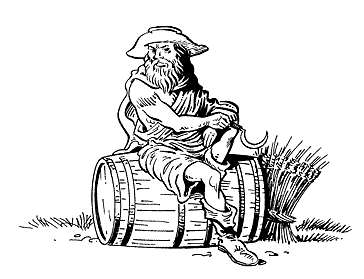Calendar, Anglo-Saxon Saterndaeg
(Saterndaeg, an Anglo-Saxon name for Saturday)
Saturn was the Roman name for the Greek Cronus, the primitive earth god of agriculture.
- He was considered the negative side of the summer sun, sacrificed to in midwinter so he might allow spring to come again.
- His important festival became the Roman Saturnalia, which contributed many of its customs to Christmas.
- Saturday got its name from Saturn and became the sabbath at the week’s end, the day before the new sun on Sunday.
- The Romans called this day dies Saturni, “day of Saturn” while the Anglo-Saxons called it Saeterndaeg or Saterndaeg.
- For the Jews, this was the seventh day when God “rested”, like Saturn inactive in darkness until the sun rose again.
- Saturn was identified with the seventh planetary sphere, whose astrological influences were characterized by saturnine qualities such as somberness, heaviness, darkness, passivity, coldness, etc.
- He was often honored and respected as a healer. In fact, the medicinal symbol Rx is said to have begun as the planetary seal of authority of Saturn, which was written on paper and eaten as a cure for a disease.
- Normal activities were suspended during the Roman Saturnalia ranging at various times from December 17-23, such as: no punishments were handed down by the courts; schools were closed; war-making ceased; the toga was replaced by an undergarment; masquerading and change of dress between the sexes occurred; gambling, especially with dice, was acceptable; social distinctions not only were not observed, but often reversed, as when masters served their slaves.
- All of the activities of the Saturnalia consisted of fertility rites to increase the fruitfulness of nature and of the people and to ensure the change of the seasons by bringing the sun back.

Time is but the stream I go a-fishing in.
